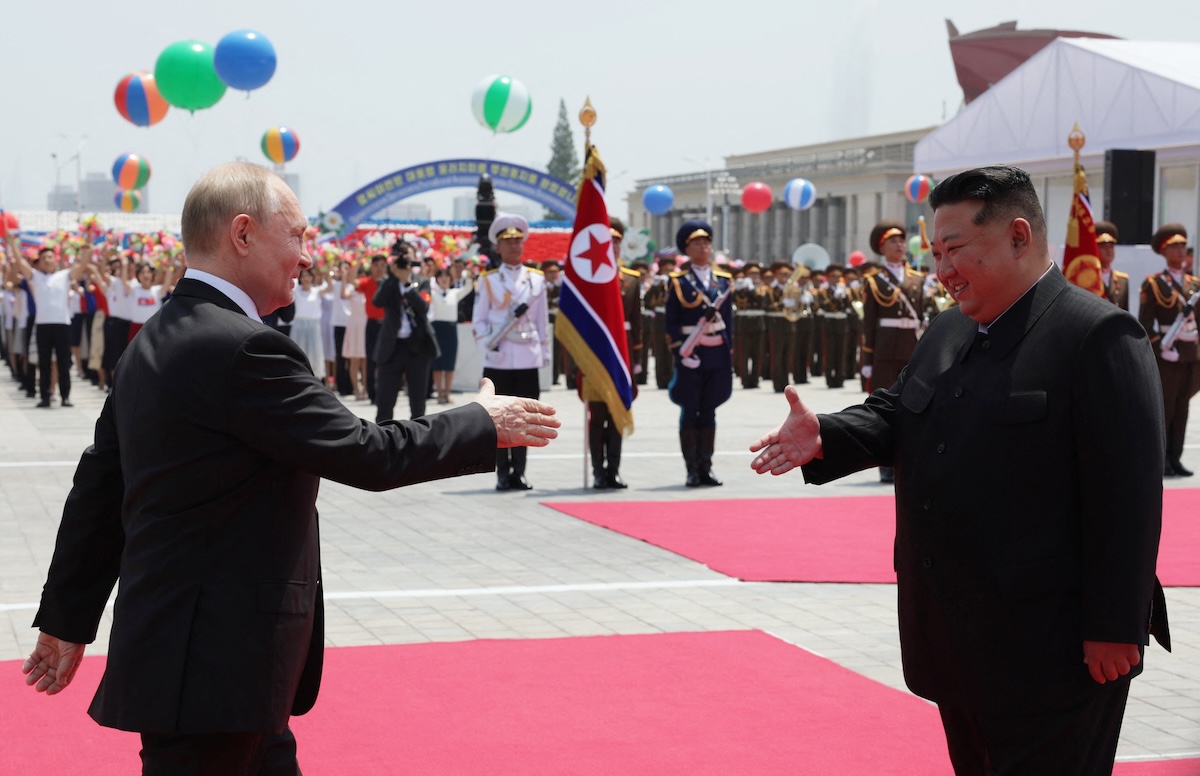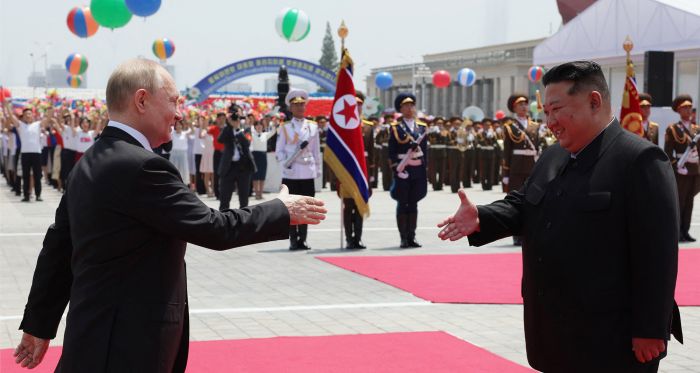The Takeaway
The recent deployment of North Korean troops to Russia, reported by South Korean intelligence on October 18, is raising tensions on and around the Korean Peninsula, prompting Seoul to rapidly reassess its defence strategies in light of the potential direct threats to not only Ukraine, but South Korea. As the South Korean government evaluates the implications for stability on the Korean Peninsula, it is also formulating its response in co-ordination with allies, including Canada.
In Brief
- Although Pyongyang and Moscow initially denied that North Korean troops were being sent to fight in the Russia-Ukraine conflict, a Russian official effectively acknowledged it at a recent meeting of the UN Security Council.
- This deployment is enabled by the North Korea-Russia Comprehensive Strategic Partnership Treaty, signed in June 2024, which allows the two sides to provide military support to the other in the event of an attack. The treaty was unanimously ratified by Russia’s State Duma on October 24, solidifying this military alliance. To try to conceal their presence, North Korean soldiers were reportedly issued forged identification documents resembling those of residents from Siberia’s Yakutia and Buryatia regions.
- The South Korean government is worried about North Korean troops gaining combat experience and acquiring advanced military knowledge from Russia. Seoul is exploring various options — including whether to provide lethal aid to Ukraine to help enhance its defence readiness — while collaborating with the U.S. and Japan to analyze the impact of North Korea’s involvement in this conflict and develop a phased response strategy.
- Canada, along with the U.S. and other NATO allies, strongly condemned the increasing military collaboration between North Korea and Russia, viewing the North Korean troop deployments as a violation of several UN Security Council resolutions. These countries are considering tightening sanctions against North Korea, increasing their support for Ukraine, and re-evaluating their strategic postures, while NATO closely monitors the situation.
Implications
There are risks of a wider war. Analysts have described the deployment of North Korean troops to Russia as signalling a “hazardous new phase” in the Russia-Ukraine war. The presence of these forces may prompt other countries to reconsider their positions, potentially igniting a chain reaction that further ‘internationalizes’ the war. There is also now a heightened risk of the conflict evolving into a proxy war involving North and South Korea. North Korean soldiers stand to gain real battlefield experience, and they may apply that combat experience on the Korean Peninsula.
Kim Jong Un has received an economic lifeline from Russia — and possible military and diplomatic upgrades. South Korea’s National Intelligence Service estimates that North Korean troops will receive C$2,783 per soldier per month. With the U.S. Pentagon estimating troop levels at 10,000, the financial benefit to the Kim Jong Un regime could reach approximately C$27.8 million per month, or roughly C$334 million annually. These funds could alleviate some of the domestic economic pressures faced by North Korea, including the punishing effects of international sanctions, and fund further military development.

North Korean troops may gain access to advanced Russian military technology, enhancing their capabilities in areas such as drone warfare, electronic warfare, and modern artillery tactics. This exchange raises the possibility of Russia providing North Korea with sensitive military technology — such as satellite launch systems, nuclear submarine technology, and ballistic missile advancements — that Pyongyang has long sought to strengthen its strategic military assets. Diplomatically, Pyongyang can also use this contribution to Moscow’s war effort as an opportunity to solidify its “blood alliance” with Russia, making the latter’s security commitments to North Korea more binding and demonstrating to South Korea and the U.S. that its relationship with Moscow is a formidable one.
There is unease in Beijing over the deployment. China’s concerns stem from the possibility that North Korea’s actions could complicate regional dynamics and invite greater U.S. involvement in East Asia – something Beijing very much wants to avoid. The U.S. has been urging China to pressure North Korea to pull its troops back, but even if Beijing were to comply — and it seems very unlikely that it will — there are questions as to whether Pyongyang would listen.
The deepening of the North Korea-Russia alliance has already strained Pyongyang’s relations with Beijing; China has removed several symbolic signs representing its amicable relationship with North Korea. Meanwhile, North Korea’s foreign minister attended a ceremony in Moscow to unveil a plaque commemorating Kim Il Sung’s first visit to the Soviet Union in 1949. Moreover, China’s muted response to this latest turn of events reflects its apprehension that regional instability might threaten its own strategic interests, including stability along its northeastern border and influence over developments on the Korean Peninsula. At the same time, Beijing is unlikely to openly criticize North Korea or Russia, given its interest in Russia’s resilience in Ukraine and the potential advantages of closer ties with both countries, considering its strategic rivalry with the U.S.
What's Next
1. Canada-South Korea military and security co-operation
Canada previously engaged in discussions with South Korea to purchase artillery shells to bolster Ukraine’s defence capabilities. These discussions might resume as both countries seek to collaborate in addressing global security challenges. In their 2+2 foreign and defence ministers’ meeting on November 1, the two countries launched an “Indo-Pacific Dialogue” to discuss co-operation and agreed to expedite negotiations for an intelligence-sharing pact.
2. South Korea’s possible policy shift toward Russia
Seoul has tried to avoid a worsening of its relations with Moscow, not only in anticipation of an eventual end to the conflict but also due to its ongoing economic ties with Russia. However, this tightening of North Korea-Russia security ties could prompt South Korea to alter its foreign policy, which could mean reducing its dependence on Russian resources such as uranium, and more robust support for Ukraine.
3. South Korea sending independent observers
Seoul is considering dispatching observer teams in partnership with Ukraine and NATO to monitor the situation, which could be an opportunity to gather intelligence on North Korean military equipment and combat tactics. Additionally, casualties among North Korean troops in Ukraine could be utilized in psychological operations against Pyongyang.
• Edited by Erin Williams, Senior Program Manager, Vina Nadjibulla, Vice-President Research & Strategy, and Ted Fraser, Senior Editor, APF Canada





